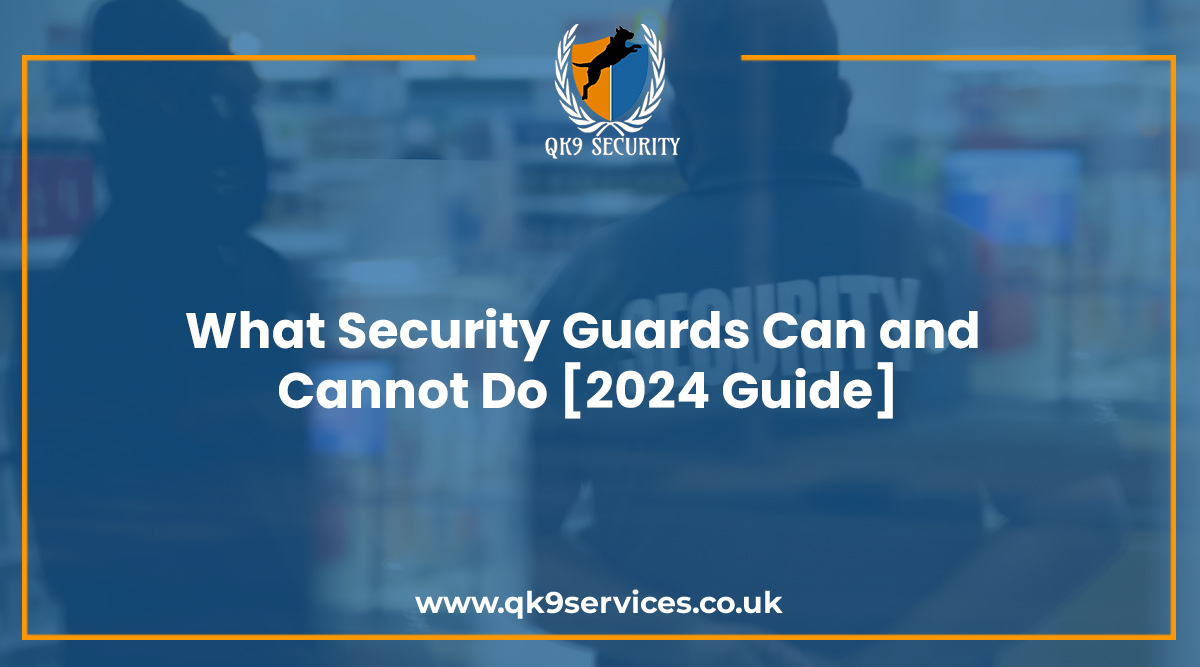What Security Guards Can and Can’t Do [2024 Guide]

Security guards are a familiar sight in our everyday lives, patrolling buildings, monitoring events, and ensuring public safety. But what exactly are their powers and limitations?
On one hand, He act as the eyes and ears of the property or event they are protecting. They are trained to be observant, patrolling their designated areas, and identifying any suspicious activity or potential threats. This vigilance is crucial for deterring crime and ensuring the well-being of those within the secured space. When incidents do occur, They play a key role in documenting what they observe and reporting it to their superiors or law enforcement. This documented information becomes vital evidence for investigations.
Finally, it’s crucial to remember that security guards are not replacements for law enforcement. Their primary function is to observe, deter, and report. They should not attempt to handle situations that are beyond their training or legal limitations. In such cases, their role is to escalate the situation to the appropriate authorities.
Maintaining Order: Core Security Guard Duties
They play a vital role in safeguarding people and property. Their core responsibilities include:
- Enforcing Rules and Regulations: They ensure adherence to established rules within their jurisdiction, whether it’s a building, event space, or retail environment.
- Monitoring Surveillance Systems: Keeping a watchful eye on CCTV cameras and other security systems allows them to identify and respond to potential threats.
- Identity Checks: Verifying identification may be required for entry into secure areas or during age verification procedures.
- Conducting Patrols: Regular patrols deter crime and ensure the safety and security of the premises.
- Crowd Control: Managing crowds at events or during emergencies is a crucial skill for Them.
Official Resources for Security Guard Regulations
The specific authorities granted to them, They can vary depending on location and employer. Here are some official resources to learn more:
- National Association of Security Professionals (NASP): https://nasphq.org/
- American Society for Industrial Security (ASIS): https://www.asisonline.org/
- State Licensing Agencies: Each state has its own licensing requirements and regulations for them. You can find your state’s agency through a web search.
Understanding a Security Guard’s Authority
While security guards play a significant role in security, it’s important to understand what they can and cannot do:
- Use of Force: They are permitted to use reasonable force to protect themselves and others from imminent harm. This is subject to common law principles of self-defense.
- Detention: In some situations, They may detain individuals suspected of criminal activity or violating regulations. However, the detainment must be lawful and for a limited time.
- Arrests: They generally do not have the authority to make arrests. They can detain a suspect and contact law enforcement for further action.
- Physical Contact: They have limited powers for physical contact. It should only be used in specific situations and within legal boundaries.
- Observe and Report: They primarily act as observers, monitoring for suspicious activity and potential threats. They document their observations and report incidents to their superiors or law enforcement.
- Detain Suspects: Security guards can detain individuals suspected of violating the law or property rules. However, this detention must be reasonable and for a limited time until law enforcement arrives.
- Enforce Property Rules: They have the authority to enforce rules established for the specific property they are guarding. This could involve asking someone to leave for trespassing or disruptive behavior.
When in Doubt, Ask!
If you’re unsure about a security guard’s authority, it’s always best to ask politely. Security guards are trained professionals and should be able to answer your questions about their role and limitations.
By understanding the scope of a security guard’s authority, we can ensure a safe and secure environment for everyone.

